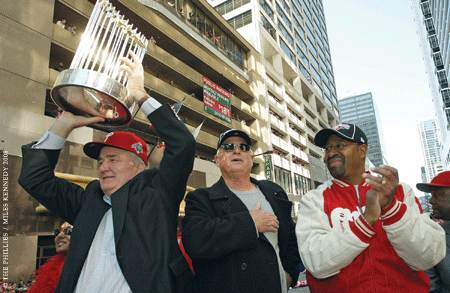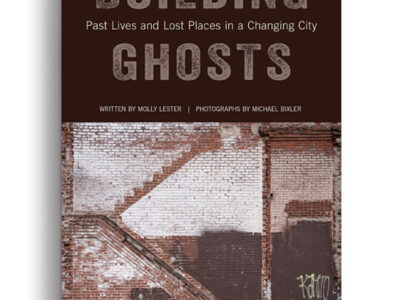
Class of ’68 | “You don’t believe it’s going to happen until that very last out,” David Montgomery C’68 WG’70 was saying. “Even that ninth inning, you kept saying to yourself, ‘Can Brad Lidge really go the entire year without blowing a save?’”
The 62-year-old president and CEO of the Philadelphia Phillies has the local wariness of fairy tales. But on October 29, the fairy tale got real when Lidge, the Phillies’ closer, fired a final 0-2 slider past the Tampa Bay Rays’ Eric Hinske, nailing down the 2008 World Series and sparking an explosion of joy in the championship-starved city of Philadelphia. Within the half-hour, Montgomery had accepted the World Series trophy from Commissioner Bud Selig and hoisted it in the air. Two days later he basked in the massive victory parade down Broad Street and the gigantic love-in at Lincoln Financial Field and Citizens Bank Park.
Though the Philadelphia native and lifelong fan was a relatively low-key presence during the festivities, as one local columnist put it: “Good luck finding a happier man in all of Philadelphia.”
A lot has happened since the last time we talked to Montgomery in the spring of 1999 [“Squeeze Play,” July|Aug 1999]. Having started his Phillies career in the sales office 28 years before, he was in his third year at the helm of a franchise that was clambering back to respectability after several years in the baseball netherworld. He talked about “building equity in the term Phillies,” and counseled patience while the team’s once-fallow farm system began growing prospects again. Though there have been plenty of bumps along the way, the Phillies now have had six straight winning seasons, with two Eastern Division championships, a National League pennant, and a World Series title under their collective belts. The success has also rekindled the city’s dormant love affair with baseball; this past year some 3.4 million fans came to the comfortable confines of Citizens Bank Park, which opened in 2004.
Early last month senior editor Samuel Hughes talked with Montgomery. Below is an edited version of that conversation.
The last time we spoke, you talked about how it felt in 1980 when the Phils won the Series and you saw the joy on all those faces along the parade route. How did this year’s celebration, with you at the helm and some lean years behind you, compare with that one?
I think we actually had more people this time. The floats are great, and one of the nice things is our players get the chance to see our fans in such a great light. It’s a different context for them. The outpouring is just unbelievable. So as you’re on a float looking out, as I mentioned years ago, it’s just amazing, the feedback you’re receiving in the form of positive acknowledgement.
I think one reason the club was so popular is that the fans identified with the players not only as talent but also as people—and as being pretty good people. And I think they were correct in that.
Any individual high points of the season for you?
It was nice that our players got to understand our fans better, and fans got to have a closer identification with our players, and understood, whether it was [Chase] Utley’s effort, or [Shane] Victorino’s hustle, Jimmy [Rollins]’s enthusiasm and commitment, [Jamie] Moyer’s citizenship in addition to his pitching—the examples go on and on. That was, at least for me, an exciting aspect. Because really, the front office is kind of the conduit between fans and players.
What sort of impact do you think the national economy is likely to have on MLB in general and the Phillies in particular?
Probably the most honest answer is, I don’t know yet. As a club, we’re pretty fortunate to have the 2008 season as our stepping-off point. Our season-ticket response has been quite strong. The major area of concern will be on the advertising front. We’ve retained directly all of our advertising relationships, so whether it’s signage, radio, television—we sell it here. On one hand that gives us direct opportunity, and we don’t have to compete against rights-holders, et cetera; on the other hand, it gives us the challenge of selling all the inventory ourselves. If there’s risk going forward, it’s certainly on that front rather than anything else.
We are fortunate that we are five years in a ballpark that’s been quite well received as opposed to being out there and trying to identify naming rights or partners. I mean, this is not the time you want to be finishing up a construction project and re-pricing your ballpark and things like that.
In the past, the game has been, compared to other entertainment options, more modestly priced, and it’s hung in all right during down times. We’re not as modestly priced as we once were, and I think that creates some of the uncertainty associated with how the economy will impact us.
Last year’s draft seems to have been a particularly good one. Your thoughts?
We hope so! You never know. Well, you eventually know; four or five years later, in our sport, you know just how solid a draft it was. We were able to get some high-school talent that included really some high-ceiling players.
We really believe that the secret to long-term success is just what we thought in the late 1990s, when we didn’t have much big-league talent. You need to keep refreshing, and the challenge where we are right now is, we want to keep as many of this group together as possible, but we probably can’t stay static. One thing you can learn from watching others is, you can’t let your team as a whole age and slide past their productive years and still be hanging onto them. You have to keep constantly infusing it with younger players.
Has Sabermetrics [basically the statistical analysis of player performance] had a big impact on the Phillies?
Ever since Moneyball was written, there are a lot of fans who follow this who think you’re on one side of an equation or another. I think the reality is that most of us are using a combination of analytical tools as far as trying to understand these numbers, but there’s still a lot of what at least we believe is understanding the makeup of the individual, where their ceiling is, et cetera.
We believe that yes, you should study the numbers, but don’t lose sight of trying to understand the individual—and, in the case of a high-school player or an amateur free agent, understand the role of their parents. You see it on campus. There are certain people that have been pushed so hard to get there that once they’re there, there’s almost academic burnout. And there are other people who it’s just all coming together for them.
The Phillies have a reputation for being quite loyal to their longtime employees, often hiring from within. Some have praised the organization as being like “family”; others have criticized it for cronyism. Your thoughts?
As an organization, we show our players and all our employees that we care about them as individuals. And that is something that we fully try to do, not just with the 25-man group that [manager] Charlie Manuel’s in charge of, but also hopefully with the 200 front-office people, and the other 30 or so scouts around the country, the other 30 minor-league player-development people, the Florida operations group—hopefully everybody feels sort of welcome.
I try to see our minor-league clubs each play a couple of times a year—that isn’t because I think I have an eye for talent. Really, it’s as much as anything a show-the-flag exercise, so that the people who work for us in [the minor-league affiliates in] Williamsport, and Lakewood, and Clearwater, Lehigh Valley, Reading, whatever, think, “Hey, I’m not forgotten.”
What’s next for Dave Montgomery and the Phils?
I have no idea. I said to somebody the other day, “I can show my face now, but as soon as we have a three-game losing streak it’s, “What’s the matter with those guys? I told you they should have done X and Y this whole season!”
One of the goals for me, because I have been here now quite some time, and we have a really good group of people, is the opportunity to mentor people and feel that as we enter a new phase—and we will some time, I don’t know exactly when—that the organization is in good hands. Since ’01, we’ve been in the hunt every year. I don’t know if we can extend the postseason string from two to three to four or whatever, but maybe it can be four out of five or something like that. It doesn’t get old for me, and I think the reason for that is, every year is different.




